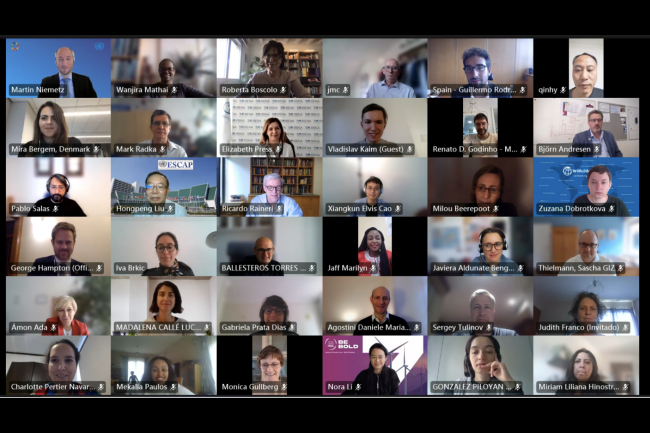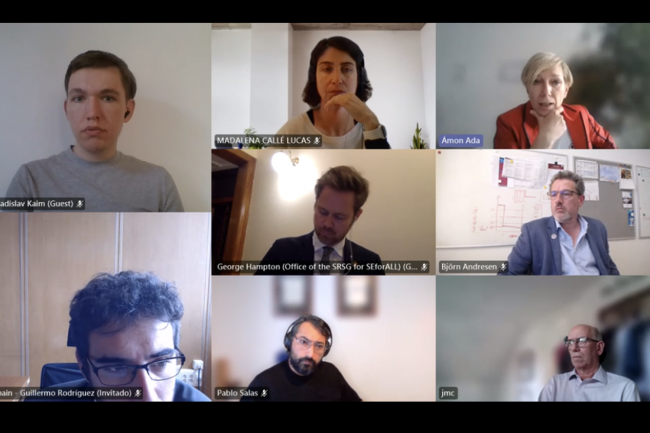The second meeting of the Technical Working Group on the Energy Transition focused on the draft report prepared by the group’s three co-leading entities: the International Renewable Energy Agency (IRENA), the UN Economic and Social Commission for Asia and the Pacific (ESCAP), and the UN Environment Programme (UNEP).
Discussions conveyed a sense of opportunity to be found in the transition, alongside the importance of coherence and political will to steer it to everyone’s benefit. Speakers said key constituencies that must be engaged in the transition include youth, cities, and the private sector. They called for recommendations on energy efficiency to be prominent in the report, and they noted a need for attention to education and training to build skills needed in the future and prepare those who will be adversely affected by the transition.
The Working Group is one of five that are preparing a roadmap to be presented at the High-Level Dialogue on Energy in September 2021. The Technical Working Group on the Energy Transition first met on 22 February 2021 to provide initial input for the roadmap. The second virtual meeting took place on 15 April 2021, with the participation of 76 experts.
Presentation of Draft Report
Opening the meeting, Mark Radka, Division of Technology, Industry and Economics, UNEP, said concrete actions recommended by the Group can be taken forward through the Energy Compacts. He stressed that the Group must identify actions that can “make a material difference to accelerate the transition” to meet the targets of SDG 7 (affordable and clean energy) by 2030 and align with the Paris Agreement’s call for net-zero emissions globally by 2050.
Elizabeth Press, Director of Planning and Programme Support, IRENA, presented the draft report of the Technical Working Group on the Energy Transition. She said every country has potential within the energy transition, it just needs a policy framework to harness this potential for the benefit of economic, social, environmental, and climate priorities.
Press highlighted several themes that permeated the 27 submissions received from Group members:
- The energy transition will only happen with meaningful, active engagement of the private sector and investors.
- Energy is no longer a “niche issue” for one or two government ministries; participation is needed from citizens, the highest levels of government, and everyone in between.
- Plenty of solutions are available to be deployed.
- All potential sources of renewable energy should be harnessed, beyond solar and wind.
- Investment in grid and other infrastructure is increasingly critical because a rising share of renewables brings a greater need to manage, store, and distribute the energy.
- Everyone is on a learning curve, so experiences and best practices should be shared continuously.
- The report should articulate the risks of inaction, including on stranded assets.
Press said the draft report recommends adopting policies to encourage uptake of energy-efficient devices, and supporting countries to make energy efficiency commitments in their Paris Agreement NDCs.
On ensuring a just and inclusive transition, Press highlighted two sides to this issue: supporting those adversely affected, and engaging those who need to be part of the new system. She explained the need for a granular approach since all groups will experience different impacts. She added that support for those affected is not as simple as reskilling related to renewable energy sources, due to complexities in timing, needed skills, and geographies, so educational strategies and social structures will need investment.
On transport, Press reported that vehicles currently account for almost 25% of global carbon dioxide (CO2) emissions, and their number will triple or quadruple in the coming decades. Therefore, she said more needs to be done to advance electric vehicles and their infrastructure, and to bring clean energy to shipping and aviation.
Finally, Press said the energy transition must be not only just and inclusive but also orderly. She explained that a careful sequencing of actions is important for reaching the SDG targets within one decade.
Discussion
“Without public support, the energy transition simply will not take place.” – Participant in break-out session
The Technical Working Group split into three groups to exchange views on the draft report. Rapporteurs then reported back on the main points discussed in each group.
Participants acknowledged the breadth of this topic, which overlaps with the topics of the other four Technical Working Groups. One speaker proposed using a graph to clarify and illustrate interlinkages. She said the complexity of the relationship between the issues also brings opportunities.
The need to ensure a just transition was discussed in depth, but participants differed over the best way to address the overlap between this Group and the Technical Working Group on Enabling SDGs through Inclusive, Just Energy Transitions. Some called for reducing the discussion in this Group’s report to allow for more detail on energy efficiency, infrastructure, and regulatory and policy measures to support the transition. Others, however, preferred to maintain an emphasis on the social aspects of the transition in this report alongside technical considerations.
Participants suggested that the report place a greater emphasis on several elements, including circular economy, the potential of green hydrogen, infrastructure, and governance and political will. Some speakers preferred to give more prominence to energy efficiency, which one said could be considered part of infrastructure investment. She explained that infrastructure can be seen as a complex chain that can both lower energy demand and use a range of carriers to satisfy demand.
Substantial discussion was held on the relevance of youth to the energy transition, with one participant calling for the report to better describe the world that young people will inherit. This speaker suggested addressing how they will adapt and the resources they will need. Speakers also suggested more nuance in the report regarding the skills that will be needed to perform jobs in new energy fields, and greater emphasis on the need for education, reskilling, and building new skills within a workforce.
Multiple experts highlighted the role of cities, where most energy consumption takes place. One pointed out that municipalities will have to facilitate a large portion of energy infrastructure, investment, and technology rollout. Another said many new cities will arise in the coming decade, and we should rethink how cities are created.
Several participants highlighted the role of citizens, without whose support the energy transition “simply will not take place.”
Priority recommendations were identified: addressing energy efficiency in building stocks; matching skills to the future we’re planning for; strengthening cybersecurity for energy systems, especially as they become more distributed; and improving regional integration of energy systems. Some of these activities were noted as potential areas for energy compacts.
In a Q&A moderated by John Christiansen, UNEP, one speaker suggested peer review studies on different aspects of the energy transition. Another called for taking digitalization further to advance energy efficiency and renewables. One participant highlighted the potential momentum around “prosumers” to engage people in design of products and diversification of economies.
Another expert said the report should emphasize the revolutionary effects of empowering those who actually use the energy.
It was suggested that Energy Compacts could focus on youth, new skills, and education needed for the energy jobs of the future.
Next Steps
Minoru Takada, Team Leader, Secretariat of the High-level Dialogue on Energy, DESA, welcomed the Group’s focus on a vision of where we want to be. Highlighting upcoming dates, Takada said each Technical Working Group will be able to review the executive summaries of the others beginning 26 April, which will provide all participants a broader picture of the roadmap. He said the Group will hold its final meeting on 17 May to conclude the report-writing exercise. The five Ministerial Thematic Forums will convene back-to-back each day from 21-25 June in a virtual format, and will also include side events.
In parallel, the Secretariat will hold workshops on the Energy Compacts.
In closing remarks, Hongpeng Liu, Director of Energy Division, ESCAP, noted the tight schedule for writing an executive summary, receiving feedback, and finalizing the full report. He requested support from all members of the Technical Working Group to stay on schedule. Liu thanked colleagues working “behind the scenes” at the co-leading agencies, and DESA for its support.
To receive continuing coverage of this event delivered to your inbox, subscribe to the ENB Update newsletter.










